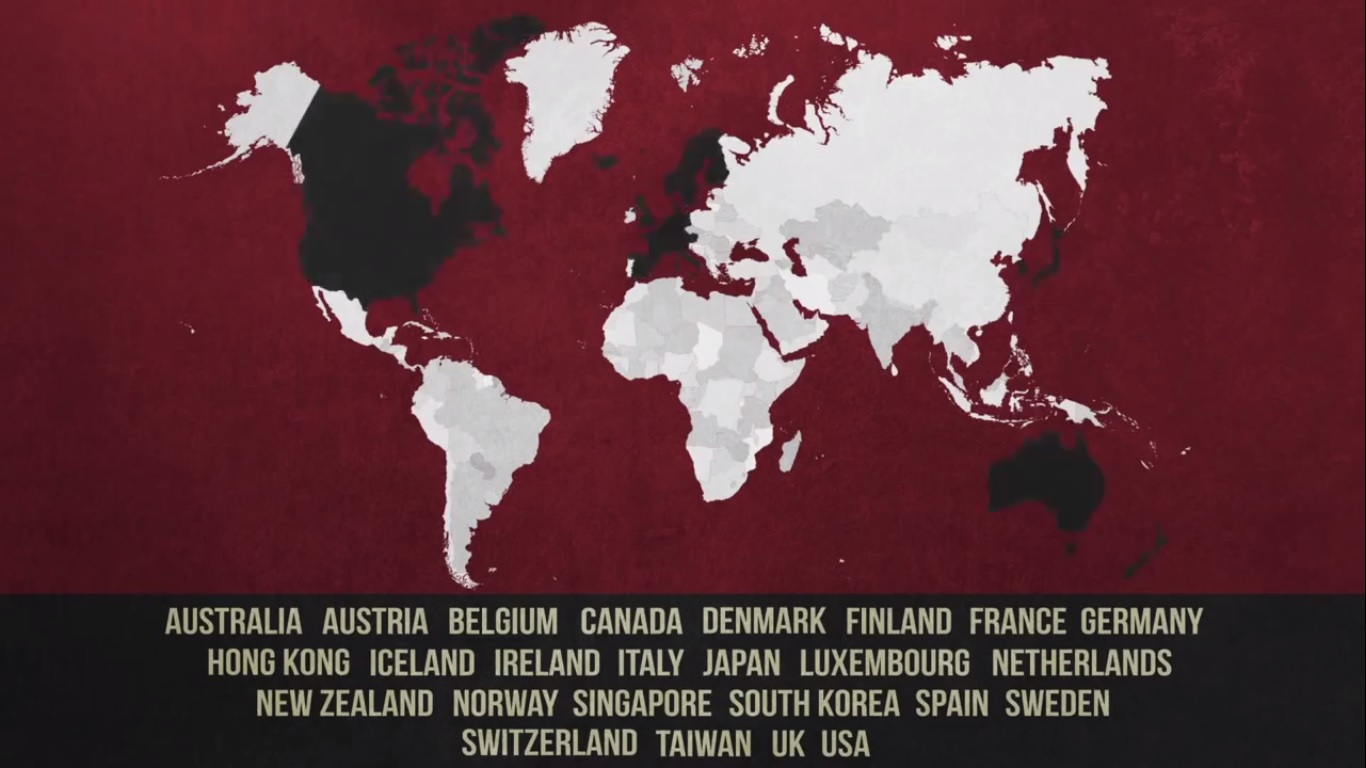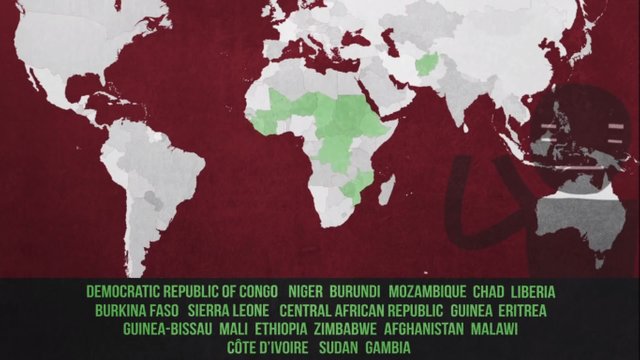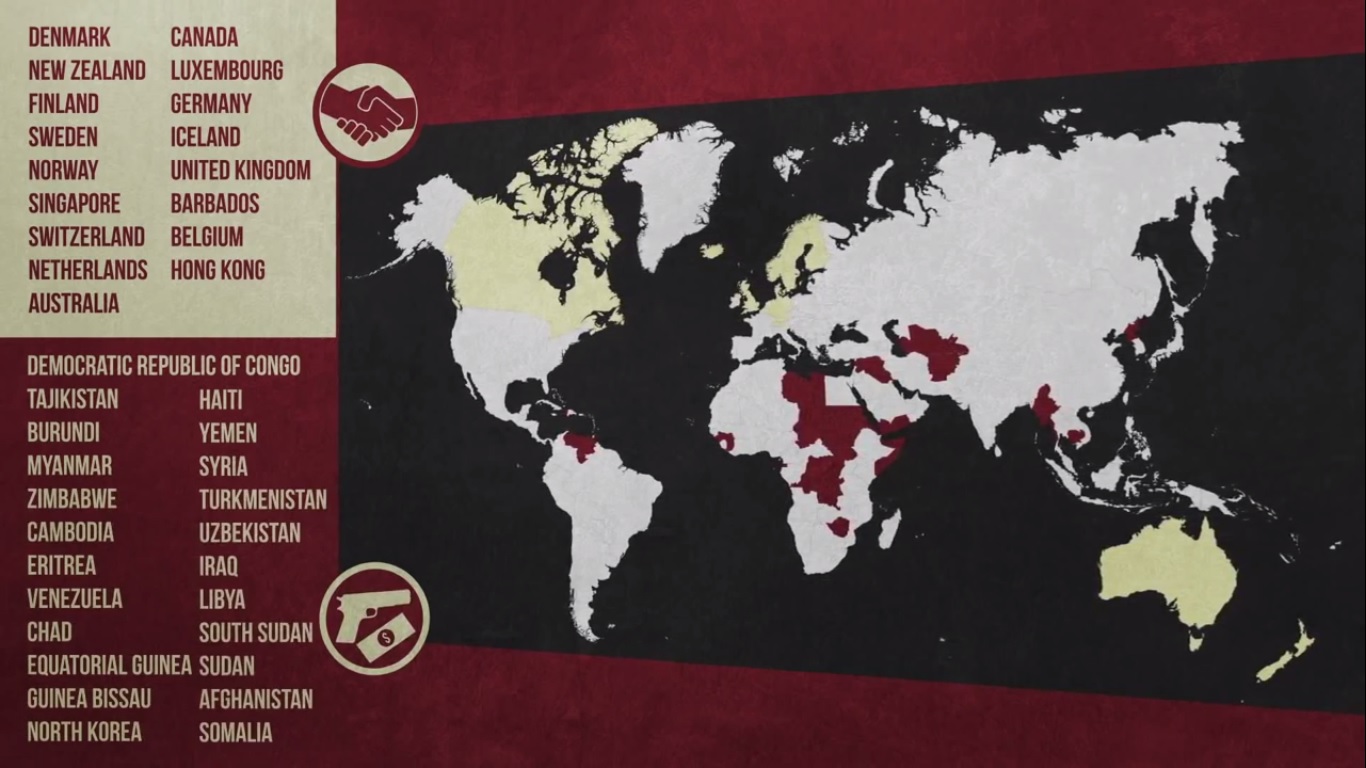Steemit School Chapter #1: Why Some Countries Are Poor and Others Rich
There are 196 countries in the world, 25 of them are very rich, having an average wealth per person of over $100,000 a year. They are:

But, far more countries are quite poor and some which we are considering here a very-very poor. These are the 20 poorest countries in the world:

where the per capita wealth is under a $1000 a year or under $3 dollars a day. Every country is now more or less on a path to growth, but the poor ones are growing very-very slowly. If Zimbabwe continues at its current growth rate, it will qualify as a rich country in 2718 years, which is 4736 AD.
What we want to know in this post is why some countries prosper and others stagnate. So that we can understand what rich countries are doing right and get a better grip on the challenges and hurdles facing poor countries.
There are basically three factors that determine whether a country will be rich or poor.
1. Institutions
Institutions are beyond important, broadly speaking, rich countries have good institutions, and poor ones have very-very bad ones. The correlation between poverty and corruption is direct. The richest countries in the world are quite simply invariably also the least corrupt ones. And the most corrupt countries are also the poorest.

When countries are corrupt, they can't collect enough taxes to get the good institutions they would need to escape the poverty trap. Half of the wealth of the world's poorest 20 countries goes into offshore accounts. Lost revenues in these countries total between 10 and 20 BILLION DOLLARS A YEAR. Meanwhile, without an adequate tax base, poor countries can't invest in police, education, health, and transport.
Now, a more generous way to look at corruption is that it's really a case of CLAN BASED THINKING. Say you are hiring someone. In the rich countries you are meant to do so simply on merit, interviewing lots of candidates and then picking the best one, irrespective of any personal connection. But, in poor countries, under this way of clan based thinking, that approach would itself be seen as corrupt. It's your duty to disregard the circled best candidate from an anonymous bunch, in order to pick someone from your own team, your uncle, your brother, your second cousin, the guys from the same tribe. As a result, the poor countries don't allow themselves access to intelligence and talent of the whole population.
2. Culture
What goes on in people's mind's, their outlooks and beliefs. A striking statistic pops up here in relation to religion. if there is one generalization you can make about religion and wealth, it's that the less people believe the richer they stand a chance of being. Nineteen of the richest countries in the world have 70% or more of their populations saying that religion is not at all important to them.

The exception here is unsurprisingly the united states, which manages to combine great religiosity with great wealth. More on that in a second. And conversely the poorest nations in the world are also extremely believing ones. In world's poorest countries, simply everyone is a believer.
Why is belief quit so bad for wealth creation?
Because in general, religiosity is connected up with the idea that the here and now can't be improved, so you should focus on the spiritual and look forward to a next world instead. It makes quite a bit of sense when you live in slums.
In the rich world on the other hand, people are generally great believers in their capacity to alter their destiny, to effort in talent. Incidentally, to explain the anomaly of the United States, religion seems not to slow down economic growth here, because it's a particular sort of religion and overwhelmingly protestant and exceptionally materialistic kind. The American god doesn't want you to think of building the new Jerusalem in the next world, he wants it here and now, in Kansas or Huston.
3. Geography
Poor countries are overwhelmingly located in the tropical regions, this isn't a co-incidence. Life is in many ways simply far-far tougher there. The problem begins with agriculture. The tropical plants are generally lot less packed with carbohydrates. Poor countries have worst soil too. Also, and perhaps surprisingly, a tropical climate can be disadvantageous to photosynthesis.
Historically, a key determinant in the likelihood of societies growing rich was their possession of large domesticated animals, such as horses and oxen, which liberated a huge part of the workforce from having to plow by hands. But, in tropical Africa, domesticated animals have throughout time been devastated by a further a poling scourge, the tsetse fly. This small fly, exclusively present in Africa because of its heat and humidity, knocks out animals on a enormous scale, making them sleepy or inactive. And, it has had a profound effect on the ability of Africans to develop technology, increase agricultural productivity, and amass wealth.
It isn't just plants and animals that suffer in the tropics, in the middle latitude, humans are open to a terrifying array of diseases including:
Arboviruses, Bacterial Infections, Dengue Fever, Yellow Fever, Cholera, E-Coli, Rota-virus, Ebola, Tuberculosis, Lassa Fever, Leprosy, Marburg, Trachoma, Yaws, Parasitic Diseases, Malaria, Leishmaniasis, Trypanosomiasis, Schistosomiasis, Filariasis, Elephantiasis, Cryptosporidium Parvum, Giardia Lamblia, Entamoeba Histolytica, Dracunculiasis(Guinea-worm disease), Cysticercosis(Pork tapeworm infection), Onchocerciasis.
A 100% of low-income countries are affected by at least five tropical diseases simultaneously. The magical temperature which has helped to make rich countries rich, is 16 degrees centigrade. However superficially unpleasant, that drop below 16 degrees as autumn starts to bite. It's quite literally a foundation stone of civilization.
Geography also encompasses transport, and poor countries are on the whole very badly connected. Landlocked Bolivia and semi-landlocked Paraguay are the poorest nations in South America. Africa has only one major navigable river, the Nile, and whose fifteen landlocked nations, eleven which have average income of $600 a year or less. Not incidentally, the poorest country in Asia, Afghanistan is also landlocked.
Then there is the matter of natural resources. natural resources like oil or precious metals can be real trouble, and paradoxically, poor countries tend to have them in spades. These natural resources are what economists call intensifiers. They will help to make a country with good institutions richer, but one with bad institutions get even poorer, precipitating whats called the resources trap.
So, the Democratic Republic of Congo is one of the world's most mineral rich countries, holding most of the world's coal-tan, which every mobile phone has a bit of inside. But natural resource wealth helps elites to grab money without requiring the cooperation of the whole society. If the only way to grow wealthy is to assemble high-tech aero-engines for example, you are going to need your whole society to buy into the project. But if you just need to extract a few minerals, you can do so with a small labour force, some guns and an air strip long enough to fair your loot out to the market. The wealth from coal-tan keeps the Democratic Republic of Congo armed rebels in guns and corrupt every level of society.
So how should one weigh up the relative importance of all these different factors?
1. Institutional,
2. Cultural, and
3. Geographic
in determining the wealth of nations. There is no hard and fast rules but as a guide one can suggest that 50% of a nations wealth comes down to the state of its institutions, 20% is due to its culture and 10% each can be allocated to latitude(GEO), connectivity with the rest of the world(GRAP), and geo related good fortunes(HIC).
If you're a policy maker, this discussion has wide practical implications, but at a more personal level. One might take away two things from it:
1. Modesty: You should have a better idea of what you owe your individual success to. Which is not so much your own hard-work or fine mind, as the broader society you live in, which was produced over centuries, and which you now draw benefit from unknowingly.
2. Sympathy: At the same time sympathy and an ability not to see failing societies just as basket cases, but rather as countries facing comprehensible and hugely difficult problems. Our sympathy can be enhanced by reflecting that the troubles of desperate lands are to a considerable extant to do with malaria, a lack of navigable river, and horrific buzzing of the tsetse fly, rather than some more intimate human failing, which we would ourself never manifest.

this post makes me remember the famous quote : "Africa is not poor it is being looted"
you are right, most of the countries in Africa is being looted by its own people, the elites.
Thank you @cryptogecko for promoting this post together with https://steemit.com/budget/@jerrybanfield/introducing-steem-budget-proposals
Greetings! I am a minnow exclusive bot that gives a 5X upvote!
I recommend this amazing guide on how to be a steemit rockstar!
I was made by @EarthNation as part of our effort to bring equality and abundance to all races, creeds and classes of humankind.